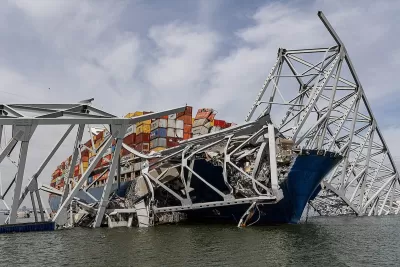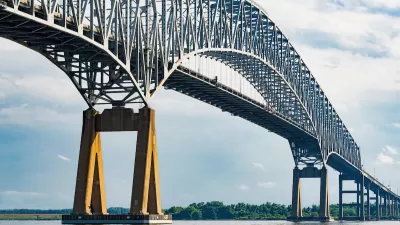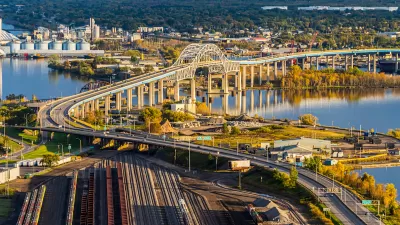The loss of a key route to the Port of Baltimore is causing major delays and long detours on alternate routes.

Baltimore-area residents are still feeling the impacts of the March collapse of the Francis Scott Key Bridge, which, when open, carried more than 34,000 vehicles including over 3,000 commercial trucks per day.
In a piece for The Baltimore Banner, April Quevedo writes, “Trucks carrying hazardous materials that used the bridge to cross the harbor are now forced to go around the Beltway in the opposite direction (a 35-mile detour) due to cargo restrictions through Baltimore City traffic tunnels — though not all hazmat vehicle operators adhere to commodity restrictions.”
An analysis of traffic accident and congestion data reveals that “Baltimore-area traffic congestion along certain corridors of major highways has increased by at least 25% since the collapse of the Key Bridge,” with tunnels bearing the brunt of the impact. Northbound travel times in the Baltimore Harbor and Fort McHenry tunnels are up by 100 percent and 200 percent.
A representative from the MDTA told Capital News Service the agency “continues to ‘monitor commute times along the alternative routes, adjust signal timing when appropriate, and clear crashes from travel lanes as quickly as possible to mitigate congestion.’”
FULL STORY: Gridlock: Baltimore-area drivers continue to feel the impact of the Key Bridge collapse

Planetizen Federal Action Tracker
A weekly monitor of how Trump’s orders and actions are impacting planners and planning in America.

Chicago’s Ghost Rails
Just beneath the surface of the modern city lie the remnants of its expansive early 20th-century streetcar system.

San Antonio and Austin are Fusing Into one Massive Megaregion
The region spanning the two central Texas cities is growing fast, posing challenges for local infrastructure and water supplies.

Since Zion's Shuttles Went Electric “The Smog is Gone”
Visitors to Zion National Park can enjoy the canyon via the nation’s first fully electric park shuttle system.

Trump Distributing DOT Safety Funds at 1/10 Rate of Biden
Funds for Safe Streets and other transportation safety and equity programs are being held up by administrative reviews and conflicts with the Trump administration’s priorities.

German Cities Subsidize Taxis for Women Amid Wave of Violence
Free or low-cost taxi rides can help women navigate cities more safely, but critics say the programs don't address the root causes of violence against women.
Urban Design for Planners 1: Software Tools
This six-course series explores essential urban design concepts using open source software and equips planners with the tools they need to participate fully in the urban design process.
Planning for Universal Design
Learn the tools for implementing Universal Design in planning regulations.
planning NEXT
Appalachian Highlands Housing Partners
Mpact (founded as Rail~Volution)
City of Camden Redevelopment Agency
City of Astoria
City of Portland
City of Laramie





























